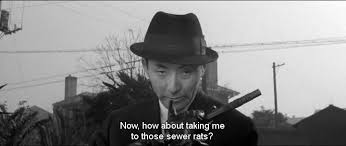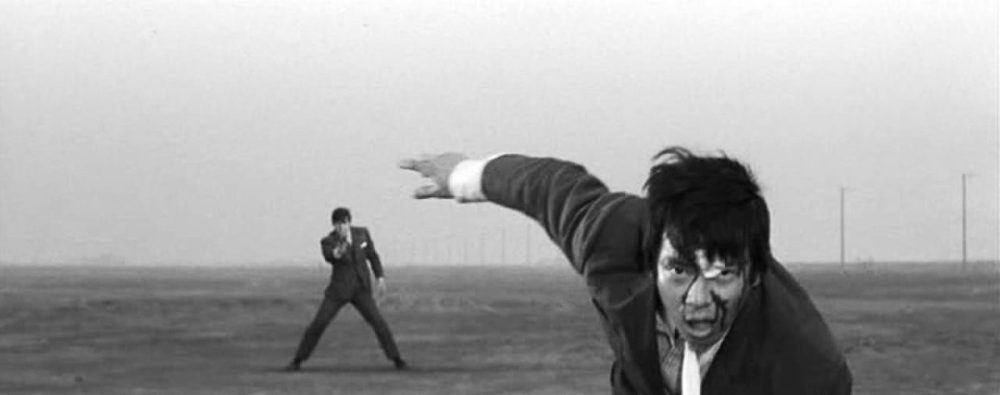*This film was released in 1952-There will be spoilers*
Written by Akira Kurosawa, Hideo Oguni, and Shinobu Hashimoto and directed by Kurosawa in 1952, “Ikiru” (translated as ‘To Live’) is a drama that is considered by many to be Kurosawa’s finest achievement from his lauded filmmaking career. The story follows Kanji Watanabe (Takashi Shimura), a middle-aged Japanese bureaucrat that discovers that he has stomach cancer, a death sentence that forces him to search for meaning as he reflects on a life that he’s wasted stamping forms that only serve to waste people’s time. The beginning of the film perfectly sets up the roundabout rigmarole that goes on in the local government departments, proving the inefficiency of bureaucracy. A group of mothers are trying to get a cesspool in their neighborhood cleaned up and made safe for their children, but each representative in turn says that such a project would be better serviced by the next department until they’re brought back to where they started. Finally they lambaste the clerks in Kanji’s office and leave discouraged.

Kanji learns that he indeed does have stomach cancer and initially tries to find meaning in the pleasures of life, but discovers in the midst of a nightclub that this is no solution. After befriending a young novelist (Yūnosuke Itō) in a bar Kanji admits that he’s worked his whole life for his savings, and now that he’s dying-he doesn’t know how to spend it. The novelist is entranced by Kanji’s story and whisks him away on a tour of the nightlife. Kanji enjoys himself for awhile, but at one of these parties a piano player asks for requests, and he responds with “Gondola no Uta”, or “The Gondola Song” an old romantic ballad, and the pianist begins to play as Kanji solemnly sings in a manner most soul crushing; “life is brief fall in love, maidens before the raven tresses begin to fade before the flame in your hearts flicker and die for those to whom today will never return.”
Eventually Toyo (Miki Odagiri), the youngest member of Kanji’s section at the public works, tracks him down to get his stamp of approval for her to quit and move on to a more fulfilling occupation. They end up sharing the rest of the day in each other’s company as Kanji realizes that she despises the public works as much as he does. He clings to Toyo even after she leaves the public works because her youth and joy remind him of what he wants out of life. He eventually reveals his situation to her and she points out that she only gets happiness by working in a toy factory knowing she is making children happy-which is the realization that propels Kanji to do something meaningful with the remainder of his time on Earth. In one of the many perfect shots of the film Kanji rushes out of the cafe as a separate group sings Happy Birthday to a colleague as he descends a staircase in a representation of his rebirth, he has found his purpose.

What I found to be particularly effective were the scenes without Kanji, where those closest to Watanabe, co-workers and family, talk and gossip about his actions and intentions. It brilliantly focuses on the reactions and suspicions of those in his orbit, who are unaware of his illness and the existential crisis that he is facing. Coworkers often cite the fact that the corporate world is full of competition and that many will likely look to fill Kanji’s seat at the head of the table after he misses his first day in thirty years. His son Mitsuo (Nobuo Kaneko) and his fiance are the unknowing culprits of the most painful things said to Kanji throughout the film. They are distant in nature and only seem to want to retrieve Kanji’s retirement funds to buy a house and start their own lives. Kanji even attempts to tell his son about his stomach cancer but the discussion turns sour upon misdirected assumptions about Kanji and Toyo. Which is all the more painful as earlier in the film there are several sequences that show the longing he has for Mitsuo as he was raising him, his wife and Mitsuo’s mother had died young, so Kanji provided for his son the only way he knew how. He worked long hours at a job filled with meaningless paperwork and never remarried for the sake of his son. Kanji clearly misses the closeness he once shared with his son and there are some effectively brutal scenes throughout the film that accentuate how far the divide has grown in that time. Once Kanji finds his purpose, to not only clean up the cesspool referenced earlier in the film, but to build a children’s park in its place, he effectively disappears from the film. We only see the fruits of his labor, and his path there, through flashbacks after his eventual death. Which leads me to the most satisfying portion of the film.

My favorite part of the film is when we jump five months in the future to Kanji’s wake after the park has been built. We are soon informed that the deputy mayor and his aides have also attended Kanji’s wake after giving a rather self serving speech at the park’s opening ceremony. The wake is interrupted by a slew of journalists waiting outside as the mayor discounts Kanji’s efforts to get that park made, they scoff at the reporters who assert the local citizens’ opinion that Kanji Watanabe built the park. “They don’t know how government works!” they proudly defend, and that no one man could build that park. Since Kanji didn’t tell most people that he had stomach cancer the claim is made that even he didn’t know that he had the illness, thus having no clear drive or motivation to complete the project and thereby discounting the claims that he deserved credit for getting the park built. The whole sequence is intercut with flashbacks from the last five months in which Kanji visited every person and department possible to push and plead for people to simply do their jobs. Efforts to paint him as intruding on the jurisdiction of other departments fall short after several people point out that Kanji was threatened when he got in the way of powerful people wanting to build a red light district there. Others also begin to remember Kanji referencing that he didn’t have time, that he seemed intent on his goals before his time ran out. This effectively sets the record straight for the remaining bureaucrats and Kanji’s family as they realize that he knew that he was going to die the entire time. We then see the final moments of Kanji Watanabe’s life as he swings in the park in the snow. He looks content, tired, and full with happiness as he sings “Gondola no Uta” one last time, but with a joyful heart this time.
“life is brief.
fall in love, maidens
before the crimson bloom
fades from your lips
before the tides of passion
cool within you,
for those of you
who know no tomorrow”
Final Score: 1 brand new hat & the satisfaction of fulfillment in life
















